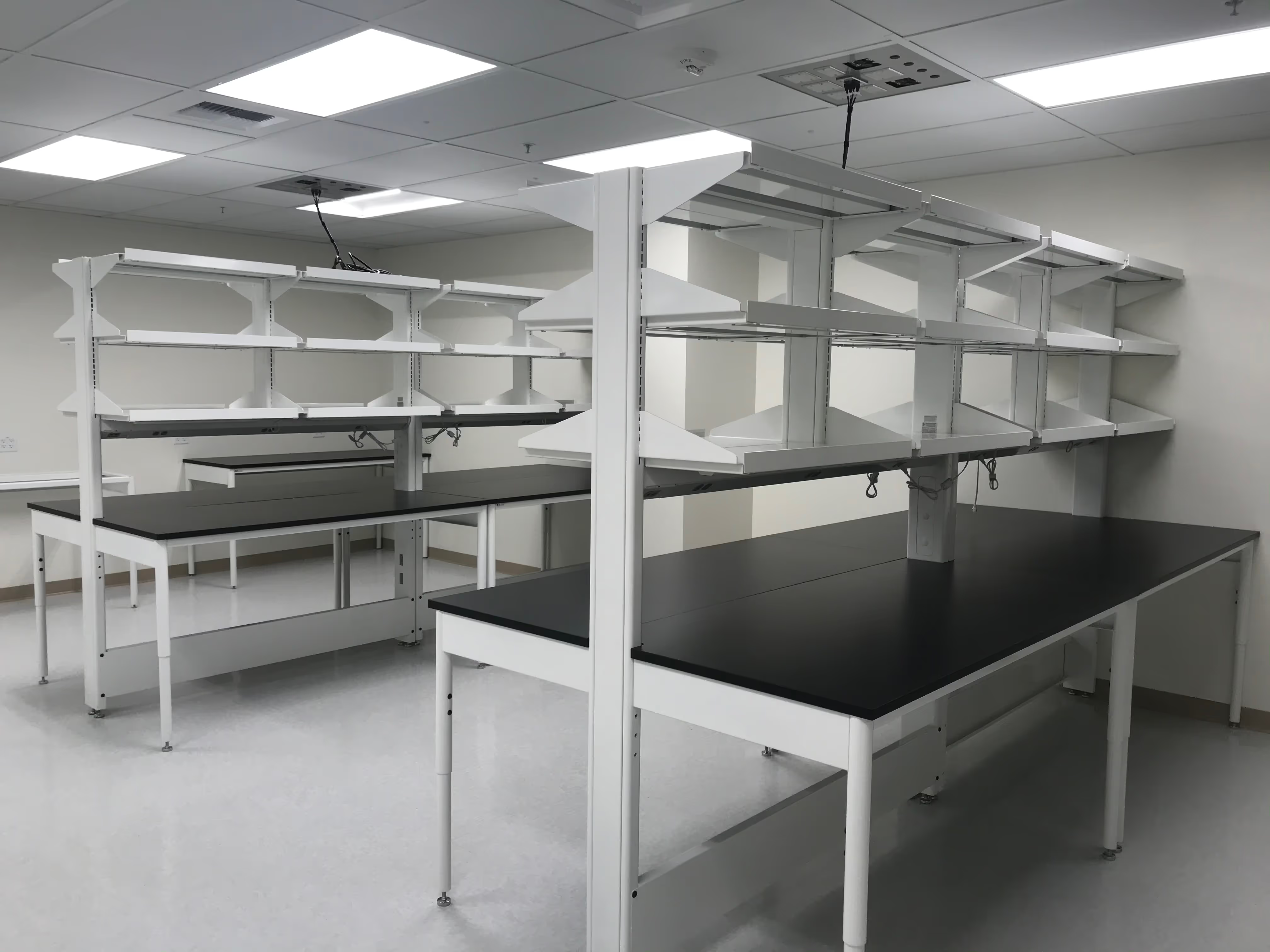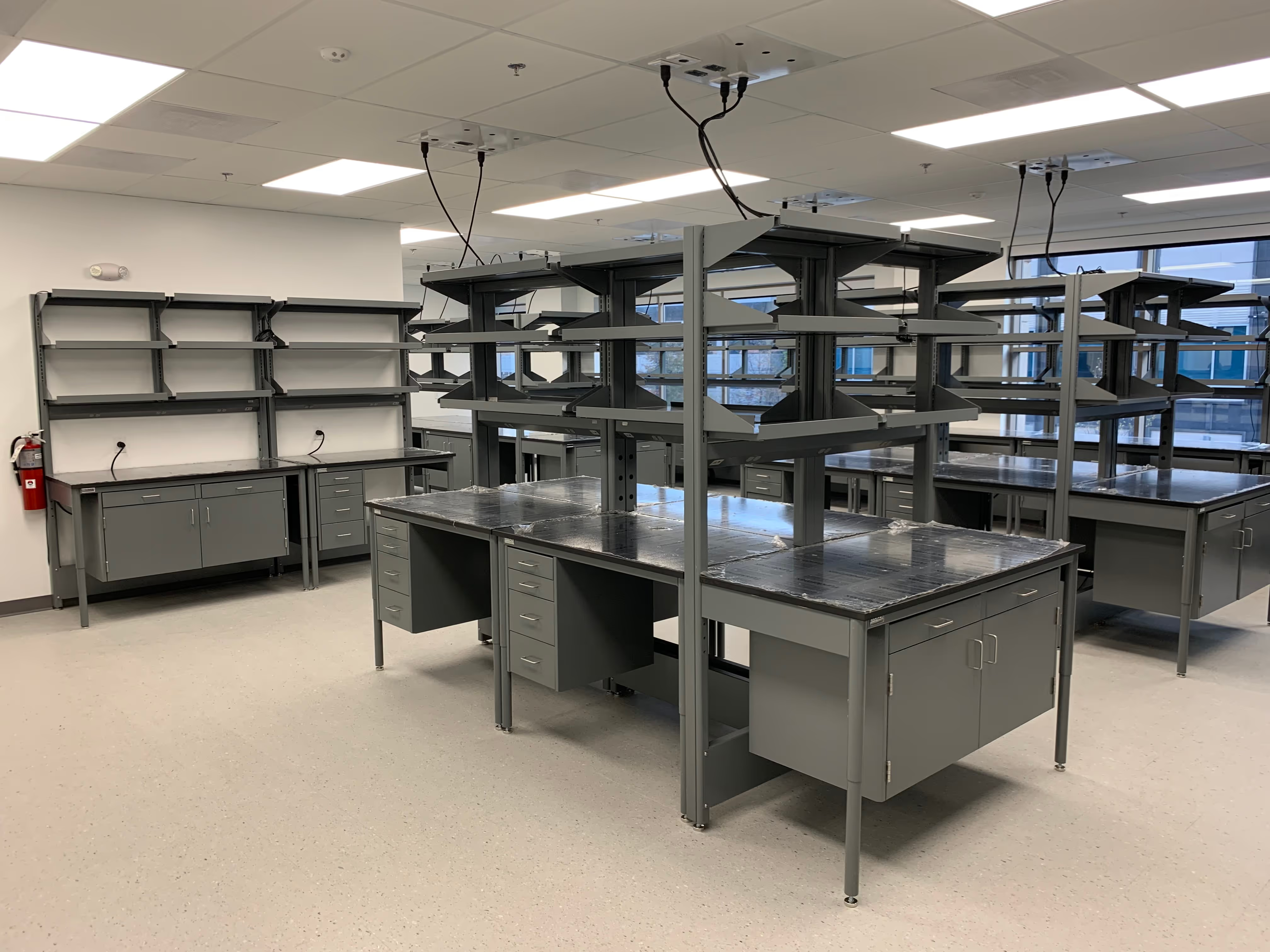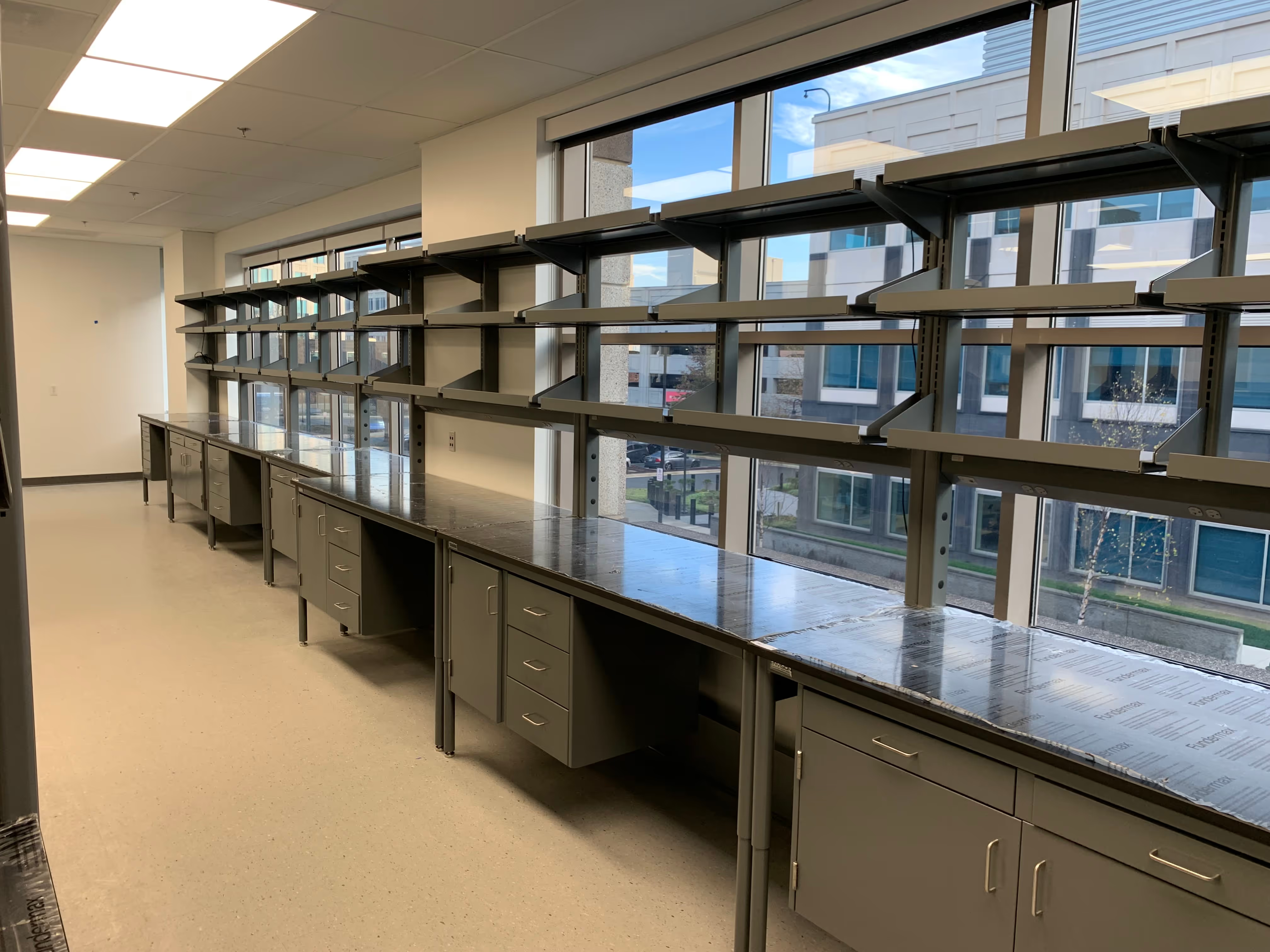What is Laboratory Casework?
Laboratory casework refers to specialized cabinets, benches, and storage systems for lab environments. It is built from durable materials such as wood, painted steel, or stainless steel and ensures safety, chemical resistance, and adaptability. It integrates with work surfaces and fume hoods, forming the backbone of efficient, compliant laboratory design.
Defining Laboratory Casework
Laboratory casework is the backbone of any lab—cabinets, benches, and storage systems designed specifically to survive the chaos of science. Unlike standard cabinetry in a kitchen, lab casework is engineered to handle heavy equipment, chemical spills, and the occasional “oops” moment that comes with research.
The difference between standard cabinetry and specialized lab casework isn’t just cosmetic; it’s survival. Standard wood cabinets from your local hardware store weren’t built for acids, solvents, or the weight of centrifuges. On the other hand, lab casework is tested and designed for chemical resistance, durability, and compliance with safety standards. It’s the difference between wearing flip-flops to a construction site versus steel-toed boots—both cover your feet, but only one keeps you safe when things drop.
Durability is non-negotiable. Lab environments demand materials that withstand daily wear, repeated cleaning, and heavy use without buckling. Safety is equally important: proper ventilation, fire resistance, and spill protection are built into the design. And then there’s customization—because every lab is different. A teaching lab may prioritize cost-effective wood casework, while a pharmaceutical lab might require stainless steel for sterile, easy-to-clean environments.
The bottom line is that laboratory casework isn’t just furniture—it’s infrastructure. It supports workflow, protects people, and ensures labs run smoothly under pressure.
Curious how different materials perform in real-world labs? Explore ICI Scientific’s laboratory furniture solutions to see how durable, customizable casework can shape a safer, smarter workspace.

Types of Laboratory Casework
When people ask about laboratory casework, they usually picture rows of cabinets and benches. But not all casework is created equal. The material and configuration you choose can differentiate between a lab that lasts decades and one that needs replacing before the next grant cycle.
- Wood Casework
- This is the classic option in educational settings like high schools or community colleges. It’s cost-effective, looks familiar, and works well in light-duty labs with minimal chemical exposure. The downside? Wood won’t withstand harsh solvents or extreme moisture, so it’s best suited for teaching environments rather than heavy-duty research.
- Painted Steel Casework
- Painted steel is the workhorse of research labs. It’s durable, versatile, and resistant to many chemicals. Unlike wood, steel won’t warp or swell, and with a high-quality finish, it can handle daily cleaning and moderate chemical exposure. It’s the sweet spot between affordability and durability, so it’s so widely used.
- Stainless Steel Casework
- When it comes to tough environments, stainless steel is the gold standard. It’s highly chemical resistant, easy to sterilize, and perfect for labs requiring strict hygiene, like pharmaceutical or bioscience facilities. Yes, it’s pricier, but nothing else compares for sterile or corrosive environments.
- Specialty Configurations
- Modern labs don’t always fit into neat boxes, which is why specialty options like mobile casework and modular systems are gaining popularity. Mobile casework allows labs to rearrange layouts on the fly, while modular systems make future expansions or reconfigurations painless. Flexibility is no longer a luxury—it’s an expectation.
The type of casework you choose isn’t just about looks—it’s about performance, safety, and long-term value.

Key Benefits of Lab Casework
The real power of laboratory casework isn’t that it holds beakers and balances; it keeps labs safe, organized, and future-ready. Here’s why investing in the right casework pays off long after the installation crews leave.
- Strength and Durability
- Labs aren’t storing coffee mugs—they’re housing centrifuges, microscopes, and equipment that weighs as much as a small car battery. Casework has to handle that load without wobbling or collapsing. High-quality lab casework is built like a tank, engineered for decades of daily use.
- Chemical and Spill Resistance
- Standard cabinetry and mystery solvents don’t mix. One splash of acid and you’ve got expensive damage to fix. Lab casework, by design, uses surfaces and finishes that resist corrosion, staining, and breakdown from chemical exposure. That means spills become cleanup jobs, not replacement projects.
- Flexibility for Changing Lab Needs
- Science changes fast, as do the people and projects inside a lab. Casework comes in two main flavors: fixed and modular. Fixed is sturdy but static, while modular lets you reconfigure layouts as programs evolve. With modular options, today’s teaching lab can become tomorrow’s biotech space without tearing down walls.
- Integration with Other Lab Systems
- Good casework doesn’t exist in isolation. It integrates seamlessly with work surfaces, fume hoods, sinks, and storage systems, creating a cohesive environment where everything works together. This synergy boosts efficiency, smooth workflows, and ensures labs meet compliance standards without compromise.
Lab casework isn’t just furniture—it’s the skeleton of the lab. Without strong, resistant, and flexible systems, the whole body of science can’t function properly.

ICI Scientific’s Laboratory Casework Solutions
ICI Scientific takes laboratory casework beyond basic storage, delivering durable, adaptable systems tailored to each client’s unique environment. Their portfolio and support services make them a trusted partner for institutions that need more than off-the-shelf cabinetry.
- Full Range of Materials
- ICI manufactures casework in wood, painted steel, and stainless steel, ensuring options for every type of lab. Wood is an excellent fit for cost-sensitive educational settings, painted steel brings durability and versatility for research, and stainless steel provides unmatched chemical resistance and hygiene for demanding environments. Each choice is engineered with safety and longevity in mind.
- Modular and Custom Options
- Not all labs follow the same blueprint, so ICI offers modular casework and fully customized solutions. Modular designs allow institutions to adapt and reconfigure as programs evolve, while custom builds provide specialized configurations that fit perfectly into niche workflows. It’s flexibility without sacrificing strength.
- Design and Planning Support
- ICI doesn’t just ship furniture boxes—they collaborate with institutions from the planning stage forward. With design assistance, 3D renderings, and BIM/AutoCAD support, project managers can visualize and refine layouts before installation. This ensures casework isn’t just compliant, functional, and efficient from day one.
- U.S.-Manufactured and Built to Last
- Every ICI solution is manufactured in the United States, meeting high safety, compliance, and durability standards. This commitment to quality means labs get casework that stands up to daily use and evolving requirements, offering long-term value without constant replacements.
With ICI Scientific, laboratory casework isn’t just storage—it’s a foundation for safe, efficient, and future-ready science.
Related Searches
Laboratory casework definition
Types of laboratory casework
Best materials for lab casework
Modular laboratory casework benefits
Laboratory casework design guidelines


